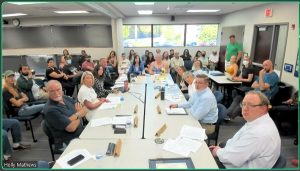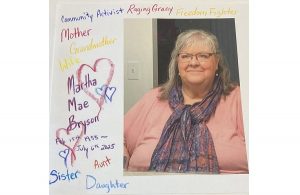LCC 4-year degree supports career education, helps resolve workforce issues
3 min read
by Marty Wilde
Lane Community College’s new bachelor’s degree finishes an experiential learning track from middle school to a four-year degree. Now, students who take the practical learning track may work their way into management and supervisory jobs that require education beyond a two-year degree, without having to stop working to get there.
LCC’s program does so at half the cost of transferring to a four-year institution. In turn, this helps resolve many of the workforce problems that drive housing and healthcare deficits in Oregon.
This program helps remediate the narrowing of educational options driven by underinvestment in education. Measure 5, passed in 1990, dealt a serious blow to career and technical education (CTE) in Oregon. With less money to spend, Oregon’s public K-12 schools dropped CTE offerings to focus on core academics. Unfortunately, many students benefit more from experiential learning than a more abstract academic path. As graduation rates dropped, employers began to complain about the lack of qualified workers in skilled trades.
Over the years, many employers, unions, and trade organizations have worked to create Associate of Science degrees at Oregon’s community colleges. However, without an introduction to these career possibilities in middle and high school, more high school graduates did not consider them as options.
Because these programs generally allow apprentices to work at a living wage while attending school part time, they open college up to families who could not otherwise afford to attend. A typical program allows an apprentice to make journeyman status in a trade and get an AS degree in four to six years. This model was adopted far beyond the trades, increasing upward economic mobility.
Oregon started to address the deficit of experiential learning in secondary education in 2016, when voters passed Measure 98. Measure 98 provided new funding for dropout prevention, college readiness, and, critically, career and technical education. The impacts have been entirely positive, with students enrolled in CTE classes graduating at a rate 15% higher than those not enrolled.
But a gap remained. Operating a business or leading in a large organization requires skills traditionally learned at a four-year institution. By the time a skilled laborer has completed their training, they often have families and financial obligations that do not allow them to return to school full time or even part time at more expensive four-year institutions.
In Oregon, four-year colleges lack dedicated funding from property tax districts and must rely on the legislature and tuition to meet their expenses, driving up costs for students. So, while Oregon State and Oregon Health and Sciences University pushed hard for online options to help students get a bachelor’s degree after an associate’s, they were not always able to do so in a cost-effective manner.
It was also often difficult for students who primarily had learned from hands-on instruction to transition to a fully-online curriculum. As a result of these barriers, only 11% of community college students nationwide transfer to four-year institutions.
In 2019, we took a first step in bridging this gap by passing a law that would allow community colleges to offer bachelor’s degrees. LCC accepted the challenge and will start offering a Bachelor’s of Applied Science in Business Management in the fall. Students will be able to complete the program in seven terms, learning the business and management skills necessary to take their careers to the next level. LCC estimates the cost to be $14,000 total, about half as much as completing a degree at a four-year public institution.
Oregonians should be able to earn a bachelor’s degree without having to borrow substantial amounts of money, interrupt a career, or rely on someone else to support their family. By providing this new track, LCC is fulfilling this long-unmet promise. If you have a moment, please write the LCC Board to thank them for working hard for all of us.
Marty Wilde represented central Lane and Linn counties in the Oregon legislature. For more of his Letters From a Recovering Politician, subscribe at https://martywilde.substack.com/subscribe.



